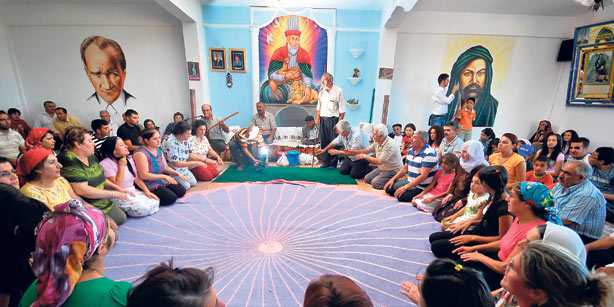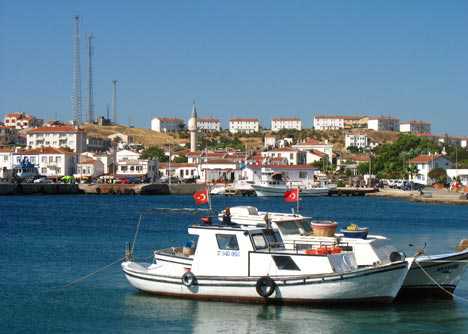
Alevi worshippers inside a cemevi. In Mersin, all cemevis will be considered as having the same status as places of worship recognized by the state. (Photo: Today’s Zaman)
6 January 2012 / YONCA POYRAZ DOĞAN, İSTANBUL
A decision by the Mersin City Council that the expenses of Alevi places of worship should be paid for out of the council’s budget was appreciated by various Alevi groups, which expressed hope to see the practice spread to other provinces.
News reports on Thursday said that the Mersin City Council decided that cemevis are places of worship and their care, repair and other expenses should be paid for by the council. The decision was unanimous in the 60-member council — with two absentees on the day of the voting – made up of members of various political parties: the ruling Justice and Development Party (AK Party), the opposition Republican People’s Party (CHP), the Nationalist Movement Party (MHP) and the pro-Kurdish Peace and Democracy Party (BDP).
The decision came following a petition by Suat Yıldız, head of the Alevi Cultural Association’s Mersin branch, of the council in September, demanding their expenses be paid by the council. Fahrettin Kılınç and Hüseyin Yıldırım, MHP and CHP members of the council, prepared a bill based on Yıldız’s petition. The five-member Mersin City Council Commission, headed by MHP member Yüksel Çelik, took the bill before the council, which approved it unanimously on Wednesday. If Mersin Governor Hasan Basri Güzeloğlu authorizes it, the decision will be implemented.
Ali Erdinç, a CHP council member, was quoted in the Hürriyet daily on Thursday as having said their party regards cemevis as Alevi places of worship and that it is natural for the state to pay their expenses.
A similar decision by the İzmir City Council last year was not authorized by the governor of İzmir.
İzzettin Doğan, chairperson of the Cem Foundation, based in İstanbul, hailed the decision of the Mersin City Council, as Alevis have been seeking official recognition of their houses of worship, cemevis.
“It is significant that the 60-member council — with two absentees — approved the bill unanimously. It is pleasing that all political parties agreed on it,” he said.
He also added that the Mersin council’s decision in could be an example for other provinces.
“If such decisions come from other city councils, too, then politicians would have a different attitude because they always say they cannot win votes from Sunni Muslims if they accept Alevi demands. But the public in general has no problems with Alevi places of worship,” he said.
Asked if such a decision could be made by the city council of İstanbul, the most populous province of Turkey, Doğan said it is possible and the Cem Foundation is going to meet soon with the governor of İstanbul about the problems of the Alevi community.
Doğan also pointed out that Sunni Muslims should not have a right to impose their beliefs on others.
“Some people in Turkey, including at the Religious Affairs Directorate, want Turks to observe Islam as it is observed in Saudi Arabia. But Turkish Islam is different. It includes Alevism,” he added.
The government has been trying to reconcile with the Alevi community, which has a long history of mistrust of the government.
However, the Religious Affairs Directorate neither allocates funds for Alevi activities nor pays the salaries of Alevi religious leaders. In effect, the directorate’s budget is reserved for the Sunni community. Alevis practice a form of Islam that distinguishes their worship from that of the Sunni Muslim majority. While there are no official figures on Turkey’s Alevi population, estimates vary from 6 million to 15 million out of a country of more than 70 million.
Fermani Altun, president of the World Ehl-i Beyt Foundation, feels that the Mersin city council made the right decision. “The decision of the Mersin council will be an example. We hope that the governor will authorize it. Turkey should not be debating the religious freedom issue at this day and age, while Turkey’s long-lasting problems are gradually being resolved,” he said.
Additionally, both the Cem Foundation and the World Ehl-i Beyt Foundation have presented their suggestions for the new constitution to Cemil Çiçek, the parliamentary speaker and head of the parliamentary Constitutional Reconciliation Commission (AUK), an ad hoc commission created in October to draft a new constitution. Both groups have demanded the state remain equally distant from all beliefs, and that freedom of religion and conscience should be arranged in accordance with international standards.
via Alevis hail Mersin Council decision to pay cemevi expenses.




